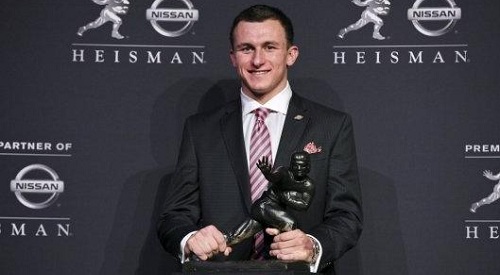
Could Johnny Manziel’s Heisman win start a movement to change NFL draft eligibility?
It was a historic moment when Texas A&M quarterback Johnny Manziel was awarded the Heisman Trophy last Saturday as college football’s top player. Manziel, dubbed “Johnny Football” for his stellar play and lights-out improvisational skills, became the first freshman to earn the Heisman since the award’s inception in 1935. Although he was a substantial favorite to win, Manziel’s victory is still somewhat surprising given voters’ historic disregard for freshmen, and it could be landscape-altering going forward.
We’ve seen top freshmen like Anthony Davis (the 2012 Naismith Player of the Year) claim every conceivable honor in college basketball, but the difference is that most of them tend to be one-and-dones; they win their awards, then they’re off to the pros. That’s not going to be the case for players like Manziel, as the NFL draft only accepts those who have been out of high school for at least three years. With Manziel serving as proof that freshmen can excel at the highest level in football as well, could we perhaps see a movement to change the NFL’s eligibility rules so younger stars have a chance to go pro sooner, as they do in basketball?
Of course, Manziel himself is far from the ideal test case here. He’s listed at 6’1”, 205 pounds, which is small by the standards of NFL quarterback. While offensive innovation in the college ranks has allowed smaller players to thrive, and while players like Russell Wilson are starting to show that smaller quarterbacks can excel in the pros as well, NFL teams are still very skeptical of players like Manziel.
Manziel’s often compared to another small-in-stature college quarterback, Boston College legend Doug Flutie, and it’s notable that despite his remarkable college career, Flutie had to go tear up the CFL for almost a decade before getting a real shot in the NFL.
Manziel’s a little bigger than the 5’10”, 185-pound Flutie, and attitudes about small quarterbacks have changed somewhat since then, but despite his accomplishments this year (3,419 passing yards, a 68.3 per cent completion rate, 24 passing touchdowns against eight interceptions, 1,181 rushing yards and 19 rushing touchdowns), he’s likely a long way from a first-round lock at the moment. Quarterbacks also often tend to take the longest time to adjust to both the college and professional games, so one-to-three further years of development in college could really benefit Manziel’s long-term career. Thus, staying in school and proving that this year was no fluke may well be better for him.
That doesn’t mean that all players need to be in college for multiple years, though (or even at all, perhaps, but that’s another debate). In particular, it’s arguable that players at particularly athletic positions (receivers and running backs come to mind) could be far better off if they had the option to leave school earlier. Consider South Carolina running back Marcus Lattimore, perhaps the best case in point here. Lattimore tore up the SEC in his freshman season in 2010, collecting 1,197 rushing yards and 17 touchdowns on 249 attempts and adding 412 receiving yards and two touchdowns on 29 catches. He was named the Sporting News Freshman of the Year and was selected to the all-SEC first team. If he’d been able to leave for the NFL draft after that, he likely would have been a first-round pick.
The next two years were rougher for Lattimore, though, as he tore a left knee ligament in October 2011 and damaged several ligaments in his right knee in a gruesome October 2012 injury. His surgery reportedly went well, and he could declare for the NFL draft this year, but he’d likely be selected much lower now thanks to his injury history. The NFL’s eligibility rules meant that despite proving himself in 2010, Lattimore had to spend two further seasons playing for nothing but a college scholarship and endangering his future earnings. That doesn’t seem like the more fair system in the world.
College basketball’s “one-and-done” system obviously has its flaws and controversies, and merely bringing it over to football may not be a perfect solution either. You’d likely see way fewer one-and-done players in football, though, as adapting to the college football level can be tough, and many players, including Manziel (but not including Lattimore), spent a year as “redshirts” where they practice but don’t play.
The numbers of true freshmen who start each year are extremely limited, and most of them would likely be better off staying in college for a few more years to improve their draft stock. Providing an option to leave earlier doesn’t seem like such a bad thing, though, especially as it would likely only be used by a select few, and it would give players like Lattimore a choice whether to move on to the pros or stay in college and risk injuries that could affect their future earnings. (There’s plenty of advantages to staying in the college ranks, too, so this isn’t a completely lopsided choice, but it should be a choice.)
That debate’s been simmering for a while, but only at a muted level, with many arguing that freshmen simply aren’t capable of being top players. Manziel’s Heisman proves that argument false, and it could be a starting point for further change.

